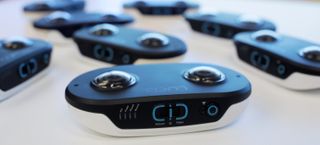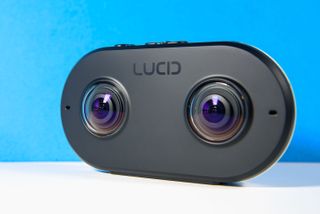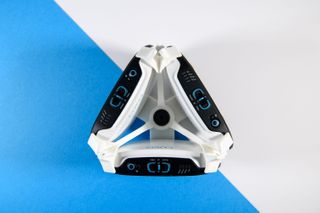Lucid VR's 180-Degree Camera Shipping Just In Time For Google's VR180 Platform

After nearly two years of development and marketing, Lucid VR is finally bringing its 180-degree 3D camera to the market. Crowdfunding partners have hardware in their hands, and the company is gearing up for general availability.
We first reported on Lucid VR’s affordable 180-degree stereoscopic LucidCam video camera in November 2015. The company launched an Indiegogo campaign to raise $100,000 to help finalize the camera’s design; ultimately, it raised $114,899.
The LucidCam Indiegogo offer listed an estimated shipping date of July 2016 for the single camera Adventure Pack and December 2016 for the three-camera “360 Pack.” Lucid VR missed the estimated shipping dates, but the company didn’t give up on its Indiegogo backers. In fact, the delayed launch was a benefit to early backers. Lucid VR’s initial offering recorded in 3D, 180-degree, Full-HD per-eye video at 30fps. In April 2016, Lucid VR partnered with Wistron Corporation to mass-produce the LucidCam camera, which resulted in an overhaul of the camera and (unfortunately) a delay in production. The current LucidCam design features 2K per-eye video recording and 4K per-eye image capture.

Lucid VR announced that the last of the shipments to Indiegogo backers have already left the warehouse, and the fulfillment team is preparing for general availability in August.
Tweaks
Lucid VR told Tom's Hardware about a few further improvements to the LucidCam--which have been made over the last couple of weeks. They include:
- Equirectangular output
- Livestream playback
- Samsung Gear integration
To take advantage of the new features, you just have to update the device's firmware and the smartphone app.
Fortuitous Timing
Lucid VR’s launch delay had another unintended and unexpected benefit. Google recently revealed that it’s making a push towards 180-degree VR content. The tech giant announced VR180, which is a new initiative to bring immersive content to the masses at a faster rate. Last year, Lucid VR CEO Han Jin saw the need for his company to create the market for 180-degree 3D content. Now, it appears the biggest player in the online video space (YouTube) is going to take the helm.
Stay on the Cutting Edge
Join the experts who read Tom's Hardware for the inside track on enthusiast PC tech news — and have for over 25 years. We'll send breaking news and in-depth reviews of CPUs, GPUs, AI, maker hardware and more straight to your inbox.
“It’s been an incredible journey to bring this product to life while the industry was chasing 360° VR. 180° VR is much more appealing to the masses, as its simplicity and user experience allows more users to easily capture VR content. With Google’s announcement one of the major players in VR is realizing the benefits of 180° VR video for consumers,” said Jin. “LucidCam creates images and videos which let you for the first time see the world through someone else’s eyes as if you were really there. I want everyone to have such incredible superpowers.”
Google’s VR180 platform provides an opportunity for content creators to jump into immersive 3D video creation without worrying about learning how to use a complicated and cumbersome 360-degree multi-camera array. 360-degree camera rigs are gaining popularity, and there’s software out there to help you sync and stitch the video feeds, but the barrier of entry for spherical 3D video remains too high for most people. And 360-degree video isn't always a great medium for storytelling, either, because the viewer doesn't get a specific frame to focus on. Google seeks to solve that problem with the VR180 platform by enabling support for stereoscopic 180-degree 3D videos on YouTube. 180-degree videos allow you to look around within the scene while restricting your view to the direction the creator intended. And unlike 360-degree recordings, which capture everything around you, a 180-degree camera allows you to create videos in a traditional manner with an on-screen set and off-screen crew.

Google also announced that it’s partnering with Yi, Lenovo, and LG to create stereoscopic cameras compatible with the VR180 platform. Google is also accepting applications from camera designers to attain certification for existing VR cameras. Google said Z Cam is first in line for VR180 certification; it didn’t reveal any other companies on the list. Lucid VR expressed excitement about the VR180 platform, so we wouldn't be surprised to hear an announcement about LucidCam support in the future.
Lucid VR started accepting pre-orders for the LucidCam camera in January, and the company is making a push to accrue as many orders as possible before the August 9 shipping date. Lucid VR is offering 15% off the purchase price of any LucidCam ordered between Monday, June 26, and Wednesday, July 28. To place an order for a LucidCam camera (or three), visit www.lucidcam.com.
Kevin Carbotte is a contributing writer for Tom's Hardware who primarily covers VR and AR hardware. He has been writing for us for more than four years.
-
zodiacfml finally. i find 360 video format dumb. i guess phones in the future and can be capable of thisReply -
Rancifer7 180 Stereoscopic is an excellent medium. 360 stereoscopic is great for things where you actually want to see everything that's going on. think videos of people walking down a trail vs videos of people chatting at a bar. Nice thing is you could use a 360 rig for 180 and just trim it down. In a magical world.Reply
Now how am I supposed to watch these videos easily? no idea. -
metathias Sure these new formats are nice, and novel. But ultimately for most mediums IE, Movies, Television, Even sports. Most of what is recorded in a 360 or even 180' video is superfluous content with little long term added value. It is certainly possible for cool content to be created that matches these dimensions, But filling up a frame that big with valuable content is extremely time consuming and expensive. Something i dont imagine we'll be seeing much of for quite a while to come.Reply -
aquielisunari Reply19855954 said:After nearly two years of development and marketing, Lucid VR is finally bringing its 180-degree 3D camera to the market. Crowdfunding partners have hardware in their hands, and the company is gearing up for general availability.
Lucid VR's 180-Degree Camera Shipping Just In Time For Google's VR180 Platform : Read more
Bringing the awesomeness of an imax theater into your living room? Still, in a headset with quality sound the audio can be distracting. You hear something running up behind you but due to the 180° FOV restriction you just see black and miss whatever it was when you turn back around. The market or infrastructure? already exists for 180° filming. 360° filming becomes a LOT more challenging. Lighting, the film maker and staff all need to be hidden.
Earth shattering? No. Interesting? Maybe.
Most Popular



